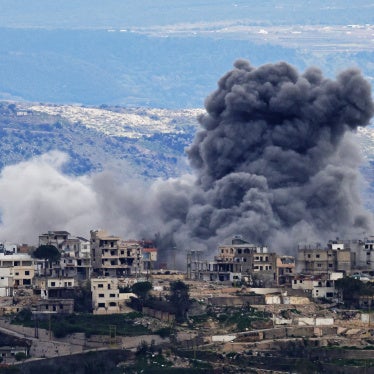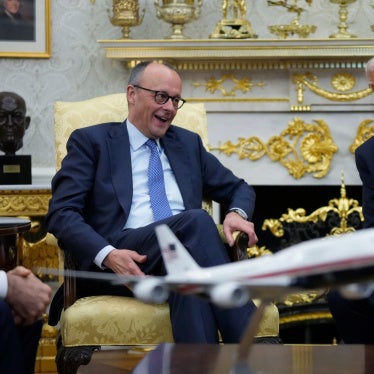(New York) - Egyptian authorities should stop beating and arbitrarily arresting peaceful demonstrators and investigate those responsible, Human Rights Watch said today. On June 10, 13, and 20, 2010, security officials beat and arbitrarily arrested demonstrators peacefully protesting an apparent beating death by police of a man in Alexandria on June 6.
"This cycle of security officials beating peaceful demonstrators, holding them for hours or days, and then finally releasing them without charge needs to stop," said Joe Stork, deputy Middle East and North Africa director at Human Rights Watch. "Security officials need to learn how to do their jobs without gratuitous violence that amounts to extrajudicial punishment."
Since photos of the mangled body of Khaled Said spread online in the days after he died, at least ten witnesses have described seeing him being severely beaten following his arrest by plainclothes security agents. Activists in Cairo and Alexandria organized a number of demonstrations to express anger over his torture and murder. A Facebook page dedicated to the incident has a membership of 241,000.
The biggest demonstration took place on June 25 in Alexandria, with more than 1,000 protesters, including Mohamed El Baradei, the former chief of the International Atomic Energy Agency and a potential presidential candidate.
On June 20, security officers arrested at least 55 protesters and detained them for up to four hours before releasing them. The demonstration was to have taken place at 5 p.m. in downtown Cairo's Tahrir Square, but a massive security presence made any gathering impossible. Protesters then assembled at nearby Bab al-Louk Square, and a group of around 100 walked from there through downtown streets chanting against the Ministry of Interior, saying it was responsible for Said's death and calling for accountability. Protesters were walking down Sharif Street when three Central Security trucks arrived, and riot police and central security officers started pushing the protesters back.
Human Rights Watch staff observed security officials beating, dispersing, and arresting protesters, journalists, and bystanders. Riot police and plain clothes security in many cases beat protesters, both male and female, to get them to move back. Even after the security officers had cordoned off all the protesters into a side street, security forces continued to hit them. Security officers arrested at least 55 protesters and took them away in vans. The officers targeted those leading the chants but also indiscriminately rounded up protesters. Among those arrested were Sayed Torky, a consultant working with Human Rights Watch, and Emad Mubarak, director of the Association for Freedom of Thought and Expression, a human rights nongovernmental organization, who were both there to monitor the protest.
"I went into the side street with some of the protesters, saw a plainclothes officer hitting a female protester, so I tried to intervene to stop him, and five of them dragged me and put me into the van," Torky said. "There were 29 of us in the van."
Security officials drove all 55 detained protesters around for hours and then started releasing them on highways outside of Cairo.
Security officials also attacked journalists and activists filming the demonstration and confiscated at least two cameras. Sarah Carr, an Egyptian-British journalist with Daily News Egypt, told Human Rights Watch that she was photographing the demonstration when a security official dragged her down by her camera strap, causing her to fall. Human Rights Watch staff saw a security officer beat and kick Philip Rizk, an activist, when they saw he was filming them arresting and beating other protesters.
"Egyptian security need to learn that there are ways of maintaining public order without beating and arbitrarily arresting peaceful protesters," Stork said.
On June 13, the youth activist group called April 6 called for a demonstration in front of the Interior Ministry. There, too, a massive security presence prevented activists from gathering, but around 200 managed to congregate in nearby Lazoughli Square, a busy area that is the site of the Justice Ministry.
One protester told Human Rights Watch:
When I got to Lazoughli Ssquare there was a huge number of riot police, but they were letting us walk around the square, around 200 of us. We were chanting against the Ministry of Interior and calling for justice for Khaled. After around half an hour they started coming in to the cordon to arrest protesters who were chanting, around four or five of us in the first swoop.
Security forces arrested 36 protesters that afternoon, releasing all later in the evening. When those being arrested struggled or tried to escape, security officers hit them and others trying to protect them from arrest. One of those arrested told Human Rights Watch:
They grabbed me from the group of protesters and hit me with their fists a couple of times when I tried to get away. They then shoved me inside the truck - there were around 16 of us at this point. They took away our mobile phones and ID cards. I saw them slap and kick protesters inside the van.
Security officers prevented journalists from taking photographs or filming and briefly arrested at least one activist filming the beatings on his mobile phone.
On June 10, about 30 people gathered in front of Sidi Gaber police station in Alexandria, calling for an investigation into Said's death. Security forces arrested 10, including two women and the Said family's lawyer, Islam al-Ebeissy. They also detained two journalists for a few hours. Security officials released five of the protesters while the public prosecutor interrogated the other five throughout the night, accusing them of disrupting public order, insulting the regime, endangering transportation, and participating in an illegal demonstration.
Authorities sometimes permit demonstrations in certain places, like the steps of the Cairo Journalists Syndicate, the public prosecutor's office, or outside the People's Assembly. But public demonstrations are only allowed by prior agreement with security officials, who never permit marches. For example, authorities allowed a demonstration on May 3 by members of Parliament against the extension of the emergency law in a cordoned-off section in Tahrir Square.
The United Nations Code of Conduct for Law Enforcement Officials states that "law enforcement officials may use force only when strictly necessary and to the extent required for the performance of their duty." The UN Basic Principles on the Use of Force and Firearms state that "in the dispersal of assemblies that are unlawful but non-violent, law enforcement officials shall avoid the use of force or, where that is not practicable, shall restrict such force to the minimum extent necessary." The principles also state that "governments shall ensure that arbitrary or abusive use of force and firearms by law enforcement officials is punished as a criminal offence under their law."
Egyptian security forces, in beating and arresting people on Sherif Street on June 20, failed to follow applicable Egyptian law enforcement regulations, namely Ministerial Order 193/1955. This regulation, "pertaining to public gatherings and demonstrations in public thoroughfares," requires that the authorities audibly warn persons who have gathered, specifying a reasonable time to disperse from the scene and directions and roads to be used to leave. This order states that if those who have gathered do not disperse, a second warning "has to be given," warning that security forces may use tear gas and truncheons to implement the order to disperse. However, this regulation itself appears to be at variance with international law enforcement standards by also authorizing the use of light firearms "aimed at the legs" if the crowd "refuses to disperse."
"Egypt's obligation to ensure the right to freedom of assembly means that authorities should facilitate the use of public areas for demonstrations and reroute traffic where necessary," Stork said.
Security officials violated article 9 of the International Covenant on Civil and Political Rights and article 11 of the African Charter on Human and People's Rights, to which Egypt is a party, by arresting peaceful demonstrators attempting to exercise their right to freedom of assembly. This right can only be restricted by law, and only to the extent "necessary in a democratic society." Any restrictions should be limited to what is necessary and proportionate to attain a legitimate purpose, and the prohibition or forceful dispersal of an assembly may only be considered when strictly necessary to meet that legitimate aim.
"Demonstrations have a democratic function, and states have a duty to protect the right to assembly," Stork said. "The fact that these demonstrators were protesting police brutality makes it even more important for the government to respect that right."






